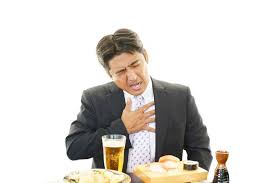
This is also called as an upset stomach or indigestion, in general term discomfort in the upper abdomen. Indigestion is not a disease, but rather some symptoms you experience, including abdominal pain and a feeling of fullness soon after you start eating.
Dyspepsia
This is also called as an upset stomach or indigestion, in general term discomfort in the upper abdomen. Indigestion is not a disease, but rather some symptoms you experience, including abdominal pain and a feeling of fullness soon after you start eating.
Symptoms:
Causes:
Complications: Underlying condition also have its own complications.
Diagnosis:
· Laboratory tests, to check for thyroid problems or other metabolic disorders.
· Breath and stool tests, to check for Helicobacter pylori (H. pylori), the bacterium associated with peptic ulcers, which can cause indigestion. H. pylori testing is controversial because studies suggest limited benefit from treating the bacterium.
· Endoscopy, to check for abnormalities in your upper digestive tract. A tissue sample (biopsy) may be taken for analysis.
· Imaging tests (X-ray or CT scan), to check for intestinal obstruction
Treatment:
· PPIs (Proton pump inhibitors), which can reduce stomach acid
· H2RAs (H-2-receptor antagonists), which is used to reduce the stomach acids.
· Prokinetics, which may be helpful if your stomach empties slowly.
· Antibiotics, if H. pylori bacteria are causing your indigestion.
· Anti-anxiety or Antidepressants medications, by decreasing your sensation of pain may ease the discomfort from indigestion.
Prevention:
· Avoiding foods that trigger indigestion
· Eating five or six small meals a day instead of three large meals
· Reducing or eliminating the use of alcohol and caffeine
· Avoiding certain pain relievers, such as aspirin, ibuprofen (Advil, Motrin IB, others) and naproxen sodium (Aleve)
· Finding alternatives for medications that trigger indigestion
· Controlling stress and anxiety
Dyspepsia, stomach upset, indigestion, abdominal pain.